48 start with L start with L
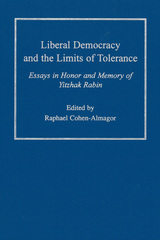

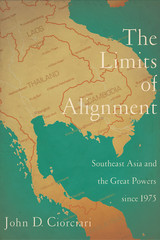
The Limits of Alignment is an engaging and accessible study that explores how small states and middle powers of Southeast Asia ensure their security in a world where they are overshadowed by greater powers. John D. Ciorciari challenges a central concept in international relations theory—that states respond to insecurity by either balancing against their principal foes, “bandwagoning” with them, or declaring themselves neutral. Instead, he shows that developing countries prefer limited alignments that steer between strict neutrality and formal alliances to obtain the fruits of security cooperation without the perils of undue dependency.
Ciorciari also shows how structural and normative shifts following the end of the Cold War and the advent of U.S. primacy have increased the prevalence of limited alignments in the developing world and that these can often place constraints on U.S. foreign policy. Finally, he discusses how limited alignments in the developing world may affect the future course of international security as China and other rising powers gather influence on the world stage.
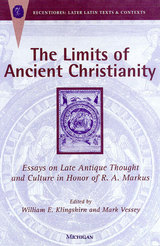
William Klingshirn and Mark Vessey have assembled some of the most influential scholars in the study of Late Antiquity to test the limits of Christianity. The sixteen essays in this collection investigate the ways in which the concept of "limits" (temporal, spatial, ideological, social, and cultural) can help us to understand the texture of Christianity during this formative period. Taken together, the essays in this volume constitute as yet the most sustained study of cultural transformations evoked by Robert Markus's phrase "the end of ancient Christianity."
This timely volume will interest students of early Christian history and theology, as well as historians of the Roman empire and early middle ages. Because it examines a formative period of western civilization, it will also speak to anyone who wonders why Christianity takes the form it does today.
Contributors include Gerald Bonner, Peter Brown, Virginia Burrus, John Cavadini, Elizabeth Clark, Paula Fredriksen, Sidney Griffith, David Hunter, Conrad Leyser, Paul Meyvaert, Oliver Nicholson, James O'Donnell, Philip Rousseau, Frederick Russell, Carole Straw, and Robert Wilken.
William E. Klingshirn is Associate Professor of Greek and Latin, The Catholic University of America. Mark Vessey is Associate Professor of English, University of British Columbia.
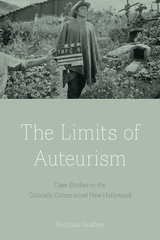
The book explores the role that contemporary critics played in determining how the movies of this period were understood and how, in turn, strategies of distribution influenced critical responses and dictated the conditions of entry into the rapidly codifying New Hollywood canon. Focusing on a small number of industrially significant films, this new history advances our understanding of this important moment of transition from Classical to contemporary modes of production.
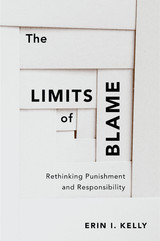
Faith in the power and righteousness of retribution has taken over the American criminal justice system. Approaching punishment and responsibility from a philosophical perspective, Erin Kelly challenges the moralism behind harsh treatment of criminal offenders and calls into question our society’s commitment to mass incarceration.
The Limits of Blame takes issue with a criminal justice system that aligns legal criteria of guilt with moral criteria of blameworthiness. Many incarcerated people do not meet the criteria of blameworthiness, even when they are guilty of crimes. Kelly underscores the problems of exaggerating what criminal guilt indicates, particularly when it is tied to the illusion that we know how long and in what ways criminals should suffer. Our practice of assigning blame has gone beyond a pragmatic need for protection and a moral need to repudiate harmful acts publicly. It represents a desire for retribution that normalizes excessive punishment.
Appreciating the limits of moral blame critically undermines a commonplace rationale for long and brutal punishment practices. Kelly proposes that we abandon our culture of blame and aim at reducing serious crime rather than imposing retribution. Were we to refocus our perspective to fit the relevant moral circumstances and legal criteria, we could endorse a humane, appropriately limited, and more productive approach to criminal justice.

The Limits of Change disputes the impression that the conservative ideas and styles of China's Republican period were neither strong nor persuasive enough to counter the ideas or the revolution of Mao. As the contributors to the book point out, these conservative movements reflected a modern outlook and shared a framework of common concepts with the radical movements they opposed.
In these essays we see the broad range of responses that conservatism in the Republican period took--from a new nativist historical consciousness, to quasi-Fascist theories of political mobilization, to efforts at a revival of Confucianism as a moral faith. Individual writers analyze the early Republican National Essence movement, the new Confucian humanism of the 1920s and afterwards, political ideology under Republican military dictatorships, and the ideas of modern literary conservatives. Two major interpretive essays placeChinese trends in the context of worldwide conservative responses to industrialization, political modernism, and the challenge of secularism.Through its far-reaching, detailed, and sympathetic assessment of the role of conservative ideology in China's modern intellectual experience, Limits of Change makes a distinguished contribution to Chinese studies.
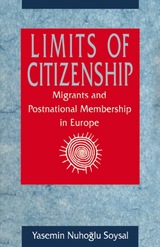
Soysal focuses on postwar international migration, paying particular attention to "guestworkers." Taking an in-depth look at France, Germany, the Netherlands, Sweden, Switzerland, and the United Kingdom, she identifies three major patterns that reflect the varying emphasis particular states place on individual versus corporate groups as the basis for incorporation. She finds that the global expansion and intensification of human rights discourse puts nation-states under increasing outside pressure to extend membership rights to aliens, resulting in an increasingly blurred line between citizen and noncitizen. Finally, she suggests a possible accommodation to these shifts: specifically, a model of post-national membership that derives its legitimacy from universal personhood, rather than national belonging.
This fresh approach to the study of citizenship, rights, and immigration will be invaluable to anyone involved in issues of human rights, international migration, and transnational cultural interactions, as well as to those who study the contemporary transformation of the nation-state, nationalism, and globalization.
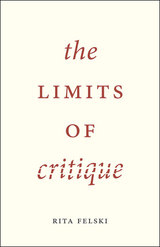
Felski argues that critique is a sensibility best captured by Paul Ricoeur’s phrase “the hermeneutics of suspicion.” She shows how this suspicion toward texts forecloses many potential readings while providing no guarantee of rigorous or radical thought. Instead, she suggests, literary scholars should try what she calls “postcritical reading”: rather than looking behind a text for hidden causes and motives, literary scholars should place themselves in front of it and reflect on what it suggests and makes possible.
By bringing critique down to earth and exploring new modes of interpretation, The Limits of Critique offers a fresh approach to the relationship between artistic works and the social world.

This book explores the early Jewish confrontation with modernity and its attendant cultural and religious challenges. Focusing on the burgeoning eighteenth-century interest in the study of Scripture, Edward Breuer examines the complex relationship between the Jewish Enlightenment and the German Aufklärung. The revival of a textual and linguistic approach to Bible study among Jews, exemplified by the new translation and commentary published by Moses Mendelssohn, was largely reflective of the aesthetic and literary concerns of contemporary Europeans.
The Limits of Enlightenment demonstrates that this revival was also informed by an acute awareness of critical European scholarship and an attempt to respond to its modern challenges. Alongside its openness to European society and culture, the German-Jewish Enlightenment was thus also shaped by a newly perceived need to defend centuries of Jewish learning and tradition.
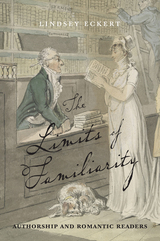
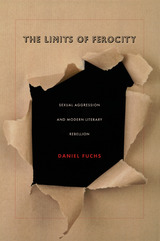
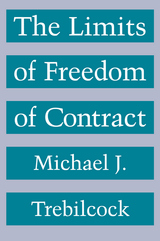
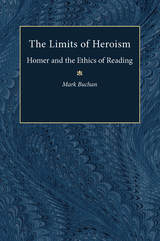
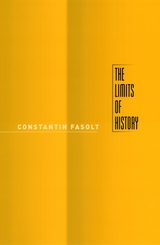
So argues Constantin Fasolt in The Limits of History, an ambitious and pathbreaking study that conquers history's power by carrying the fight into the center of its domain. Fasolt considers the work of Hermann Conring (1606-81) and Bartolus of Sassoferrato (1313/14-57), two antipodes in early modern battles over the principles of European thought and action that ended with the triumph of historical consciousness. Proceeding according to the rules of normal historical analysis—gathering evidence, putting it in context, and analyzing its meaning—Fasolt uncovers limits that no kind of history can cross. He concludes that history is a ritual designed to maintain the modern faith in the autonomy of states and individuals. God wants it, the old crusaders would have said. The truth, Fasolt insists, only begins where that illusion ends.
With its probing look at the ideological underpinnings of historical practice, The Limits of History demonstrates that history presupposes highly political assumptions about free will, responsibility, and the relationship between the past and the present. A work of both intellectual history and historiography, it will prove invaluable to students of historical method, philosophy, political theory, and early modern European culture.
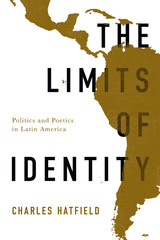
The Limits of Identity is a polemical critique of the repudiation of universalism and the theoretical commitment to identity and difference embedded in Latin American literary and cultural studies. Through original readings of foundational Latin American thinkers (such as José Martí and José Enrique Rodó) and contemporary theorists (such as John Beverley and Doris Sommer), Charles Hatfield reveals and challenges the anti-universalism that informs seemingly disparate theoretical projects.
The Limits of Identity offers a critical reexamination of widely held conceptions of culture, ideology, interpretation, and history. The repudiation of universalism, Hatfield argues, creates a set of problems that are both theoretical and political. Even though the recognition of identity and difference is normally thought to be a form of resistance, The Limits of Identity claims that, in fact, the opposite is true.
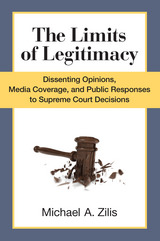
Zilis finds that the media tends not to quote from majority opinions. However, the greater the division over a particular ruling among the justices themselves, the greater the likelihood that the media will criticize that ruling, characterize it as "activist," and employ inflammatory rhetoric. Hethen demonstrates that the media’s portrayal of a decision, as much as the substance of the decision itself, influences citizens’ reactions to and acceptance of it.
This meticulously constructed study and its persuasively argued conclusion advance the understanding of the media, judicial politics, political institutions, and political behavior.
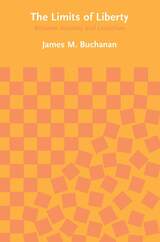
James Buchanan offers a strikingly innovative approach to a pervasive problem of social philosophy. The problem is one of the classic paradoxes concerning man's freedom in society: in order to protect individual freedom, the state must restrict each person's right to act. Employing the techniques of modern economic analysis, Professor Buchanan reveals the conceptual basis of an individual's social rights by examining the evolution and development of these rights out of presocial conditions.
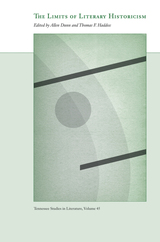
The Limits of Literary Historicism is a collection of essays arguing that historicism, which has come to dominate the professional study of literature in recent decades, has become ossified. By drawing attention to the limits of historicism—its blind spots, overreach, and reluctance to acknowledge its commitments—this provocative new book seeks a clearer understanding of what historicism can and cannot teach us about literary narrative.
Editors Allen Dunn and Thomas F. Haddox have gathered contributions from leading scholars that challenge the dominance of contemporary historicism. These pieces critique historicism as it is generally practiced, propose alternative historicist models that transcend mere formula, and suggest alternatives to historicism altogether. The volume begins with the editors’ extended introduction, “The Enigma of Critical Distance; or, Why Historicists Need Convictions,” and then is divided into three sections: “The Limits of Historicism,” “Engagements with History,” and “Alternatives to History.”
Defying convention, The Limits of Literary Historicism shakes up established modes to move beyond the claustrophobic analyses of contemporary historicism and to ask larger questions that envision more fulfilling and more responsible possibilities in the practice of literary scholarship.
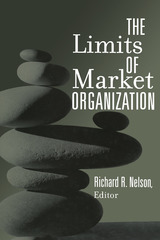
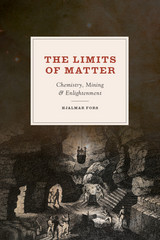
Fors reveals how, early in the eighteenth century, chemists began to view metals no longer as the ingredients for “chrysopoeia”—or gold making—but as elemental substances, or the basic building blocks of matter. At the center of this emerging idea, argues Fors, was the Bureau of Mines of the Swedish State, which saw the practical and profitable potential of these materials in the economies of mining and smelting.
By studying the chemists at the Swedish Bureau of Mines and their networks, and integrating their practices into the wider European context, Fors illustrates how they and their successors played a significant role in the development of our modern notion of matter and made a significant contribution to the modern European view of reality.

major advances in medicine are caused by changes in the way scientists describe disease.
Bleeding, sweating, and other treatments we consider barbaric were standard treatments for
centuries because they conformed to a conception of disease shared by patients and doctors.
Scientific breakthroughs in the understanding of disease in the nineteenth century transformed
treatment and the goals of medicine. Golub argues that the ongoing revolution in molecular
genetics has opened the door to the "biology of complexity," again transforming our view of
disease. This thought-provoking, timely book reveals a crucial but overlooked role of science
in medicine, and offers a new vision for the goals of both science and medicine as we enter the
twenty-first century.

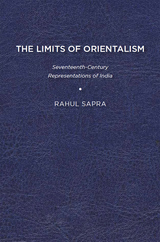
The Limits of Orientalism: Seventeenth-Century Representations of India challenges the recent postcolonial readings of European, predominantly English, representations of India in the seventeenth century. Following Edward Said’s discourse of “Orientalism,” most postcolonial analyses of the seventeenth-century representations of India argue that the natives are represented as barbaric or exotic “others,” imagining these representations as products of colonial ideology. Such approaches tend to offer a homogeneous idea of the “native” and usually equate it with the term “Indian.” Sapra, however, argues that instead of representing all natives as barbaric “others,” the English drew parallels, especially between themselves and the Mughal aristocracy, associating with them as partners in trade and potential allies in war. While the Muslims are from the outset largely portrayed as highly civilized and cultured, early European writers tended to be more conflicted with Hindus, their first highly negative views undergoing a transformation that brings into question any straightforward Orientalist reading of the texts and anticipates the complexity of later representations of the indigenous peoples of the sub-continent.
Sapra’s theoretical and methodological approach is influenced by such writers as Aijaz Ahmad and Denis Porter, who have highlighted powerful alternatives to Said’s discourse of “Orientalism.” Sapra historicizes European representations of the indigenous to draw attention to the contrasting approaches of the Portuguese, the Dutch and the English in relation to seventeenth-century India, effectively undermining comfortable notions of a homogenous “West.” Unlike the Portuguese, for whom the idea of a dynasty and the conversion of heathens went hand in hand with the idea of trade, for the Dutch and the English the primary consideration was commercial. In keeping with the commercial approach of the English East India Company, most English travelers, instead of representing the Muslims as barbaric “others,” highlight the compatibility between the two cultures and consistently praise the Mughal empire for its religious tolerance. In the representations of the Hindus, Sapra demonstrates that most writers, even while denigrating the Hindu religion, appreciate the civilized society of the Hindus. Moreover, in the representations of sati or widow-burning, a distinction needs to be made between the patriarchal and the Orientalist points of views, which are at variance with each other. The tension between the patriarchal and the Orientalist positions challenges Gayatri Chakravorty Spivak’s analysis of sati in “Can the Subaltern Speak?” which has become the standard model for most postcolonial appraisals of European representations of sati. The book highlights the lacuna in postcolonial readings by providing access to selections of commonly unavailable early-modern writings by Thomas Roe, Edward Terry, Henry Lord, Thomas Coryate, Alexander Hamilton and other the records of the East India Company, which makes the book vital for students of theory, European and South-Asian history, and Renaissance literatures.
Published by University of Delaware Press. Distributed worldwide by Rutgers University Press.
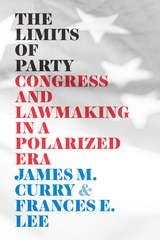
In The Limits of Party, James M. Curry and Frances E. Lee challenge this conventional wisdom. By constructing legislative histories of congressional majority parties’ attempts to enact their policy agendas in every congress since the 1980s and by drawing on interviews with Washington insiders, the authors analyze the successes and failures of congressional parties to enact their legislative agendas.
Their conclusions will surprise many congressional observers: Even in our time of intense party polarization, bipartisanship remains the key to legislative success on Capitol Hill. Congressional majority parties today are neither more nor less successful at enacting their partisan agendas. They are not more likely to ram though partisan laws or become mired in stalemate. Rather, the parties continue to build bipartisan coalitions for their legislative priorities and typically compromise on their original visions for legislation in order to achieve legislative success.

Michael Hayes offers a vigorous defense of incrementalism: the theory that the policymaking process typically should involve bargaining, delay, compromise, and, therefore, incremental change. Incrementalism, he argues, is one result of a checks-and-balances system in which politicians may disagree over what we want to achieve as a nation or what policies would best achieve shared goals.
Many political scientists have called for reforms that would facilitate majority rule and more radical policy change by strengthening the presidency at the expense of Congress. But Hayes develops policy typologies and analyzes case studies to show that the policy process works best when it conforms to the tenets of incrementalism. He contends that because humans are fallible, politics should work through social processes to achieve limited ends and to ameliorate—rather than completely solve—social problems. Analyzing the evolution of air pollution policy, the failure of President Clinton’s health care reform in 1994, and the successful effort at welfare reform in 1995-96, Hayes calls for changes that would make incrementalism work better by encouraging a more balanced struggle among social interests and by requiring political outcomes to conform to the rule of law.
Written for students and specialists in politics, public policy, and public administration, The Limits of Policy Change examines in detail a central issue in democratic theory.
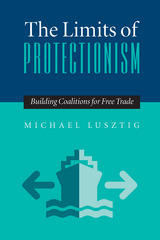
Conventional wisdom holds that free trade is economically beneficial to nations. But this does not prevent industries and interest groups from lobbying their governments for protection, which creates a fear of electoral backlash among politicians hoping to promote free trade. The Limits of Protectionism demonstrates how governments can attain those economic benefits while avoiding the political costs.
Michael Lusztig’s theoretical model focuses on a process by which protectionists can be pushed to restructure and compete in a global economy. In this process, a small cutback in domestic protection leads to lost market shares at home; producers must then turn to overseas exports, and, as the size of foreign profits grow, former protectionists become active advocates for more and greater free trade opportunities.
In a wide-ranging array of case studies—from nineteenth-century Britain to Depression-era United States to contemporary New Zealand, Australia, Brazil, Canada, Chile, and Mexico—Lusztig reveals that, if skillfully handled, governments can eliminate the obstacles to free trade and enjoy continued economic growth without fear of protectionist groups seeking revenge at the ballot box.
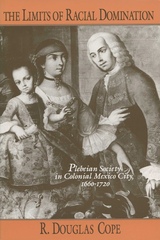
In this distinguished contribution to Latin American colonial history, Douglas Cope draws upon a wide variety of sources—including Inquisition and court cases, notarial records and parish registers—to challenge the traditional view of castas (members of the caste system created by Spanish overlords) as rootless, alienated, and dominated by a desire to improve their racial status. On the contrary, the castas, Cope shows, were neither passive nor ruled by feelings of racial inferiority; indeed, they often modified or even rejected elite racial ideology. Castas also sought ways to manipulate their social "superiors" through astute use of the legal system. Cope shows that social control by the Spaniards rested less on institutions than on patron-client networks linking individual patricians and plebeians, which enabled the elite class to co-opt the more successful castas.
The book concludes with the most thorough account yet published of the Mexico City riot of 1692. This account illuminates both the shortcomings and strengths of the patron-client system. Spurred by a corn shortage and subsequent famine, a plebeian mob laid waste much of the central city. Cope demonstrates that the political situation was not substantially altered, however; the patronage system continued to control employment and plebeians were largely left to bargain and adapt, as before.
A revealing look at the economic lives of the urban poor in the colonial era, The Limits of Racial Domination examines a period in which critical social changes were occurring. The book should interest historians and ethnohistorians alike.
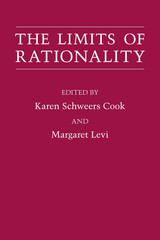
Intended to introduce novices to rational choice theory, this accessible, interdisciplinary book collects writings by leading researchers. The Limits of Rationality illuminates the rational choice paradigm of social and political behavior itself, identifies its limitations, clarifies the nature of current controversies, and offers suggestions for improving current models.
In the first section of the book, contributors consider the theoretical foundations of rational choice. Models of rational choice play an important role in providing a standard of human action and the bases for constitutional design, but do they also succeed as explanatory models of behavior? Do empirical failures of these explanatory models constitute a telling condemnation of rational choice theory or do they open new avenues of investigation and theorizing?
Emphasizing analyses of norms and institutions, the second and third sections of the book investigate areas in which rational choice theory might be extended in order to provide better models. The contributors evaluate the adequacy of analyses based on neoclassical economics, the potential contributions of game theory and cognitive science, and the consequences for the basic framework when unequal bargaining power and hierarchy are introduced.

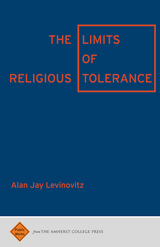
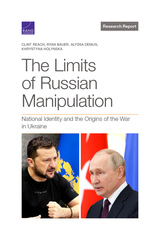
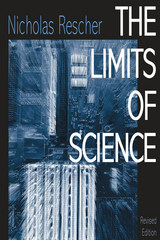

The Limits of Scientific Reasoning was first published in 1984. Minnesota Archive Editions uses digital technology to make long-unavailable books once again accessible, and are published unaltered from the original University of Minnesota Press editions.
The study of human judgment and its limitations is essential to an understanding of the processes involved in the acquisition of scientific knowledge. With that end in mind, David Faust has made the first comprehensive attempt to apply recent research on human judgment to the practice of science. Drawing upon the findings of cognitive psychology, Faust maintains that human judgment is far more limited than we have tended to believe and that all individuals - scientists included—have a surprisingly restricted capacity to interpret complex information. Faust's thesis implies that scientists do not perform reasoning tasks, such as theory evaluation, as well as we assume they do, and that there are many judgments the scientist is expected to perform but cannot because of restrictions in cognitive capacity.
"This is a very well-written, timely, and important book. It documents and clarifies, in a very scholarly fashion, what sociologists and psychologists of science have been flirting with for several decades—namely, inherent limitations of scientific judgment," –Michael Mahoney, Pennsylvania State University
David Faust is director of psychology at Rhode Island Hospital and a faculty member of the Brown University Medical School. He is co-author of Teaching Moral Reasoning: Theory and Practice.
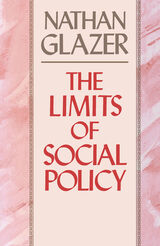
Many social policies of the 1960s and 1970s, designed to overcome poverty and provide a decent minimum standard of living for all Americans, ran into trouble in the 1980s—with politicians, with social scientists, and with the American people. Nathan Glazer has been a leading analyst and critic of those measures. Here he looks back at what went wrong, arguing that our social policies, although targeted effectively on some problems, ignored others that are equally important and contributed to the weakening of the structures—family, ethnic and neighborhood ties, commitment to work—that form the foundations of a healthy society. What keeps society going, after all, is that most people feel they should work, however well they might do without working, and that they should take care of their families, however attractive it might appear on occasion to desert them.
Glazer proposes new kinds of social policies that would strengthen social structures and traditional restraints. Thus, to reinforce the incentive to work, he would attach to low-income jobs the same kind of fringe benefits—health insurance, social security, vacations with pay—that now make higher-paying jobs attractive and that paradoxically are already available in some form to those on welfare. More generally, he would reorient social policy to fit more comfortably with deep and abiding tendencies in American political culture: toward volunteerism, privatization, and decentralization.
After a long period of quiescence, social policy and welfare reform are once again becoming salient issues on the national political agenda. Nathan Glazer’s deep knowledge and considered judgment, distilled in this book, will be a source of advice, ideas, and inspiration for citizens and policymakers alike.
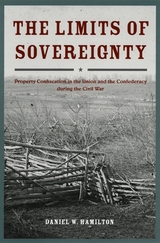
Americans take for granted that government does not have the right to permanently seize private property without just compensation. Yet for much of American history, such a view constituted the weaker side of an ongoing argument about government sovereignty and individual rights. What brought about this drastic shift in legal and political thought?
Daniel W. Hamilton locates that change in the crucible of the Civil War. In the early days of the war, Congress passed the First and Second Confiscation Acts, authorizing the Union to seize private property in the rebellious states of the Confederacy, and the Confederate Congress responded with the broader Sequestration Act. The competing acts fueled a fierce, sustained debate among legislators and lawyers about the principles underlying alternative ideas of private property and state power, a debate which by 1870 was increasingly dominated by today’s view of more limited government power.
Through its exploration of this little-studied consequence of the debates over confiscation during the Civil War, The Limits of Sovereignty will be essential to an understanding of the place of private property in American law and legal history.
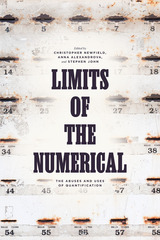
Numbers are both controlling and fragile. They drive public policy, figuring into everything from college rankings to vaccine efficacy rates. At the same time, they are frequent objects of obfuscation, manipulation, or outright denial. This timely collection by a diverse group of humanists and social scientists challenges undue reverence or skepticism toward quantification and offers new ideas about how to harmonize quantitative with qualitative forms of knowledge.
Limits of the Numerical focuses on quantification in several contexts: climate change; university teaching and research; and health, medicine, and well-being more broadly. This volume shows the many ways that qualitative and quantitative approaches can productively interact—how the limits of the numerical can be overcome through equitable partnerships with historical, institutional, and philosophical analysis. The authors show that we can use numbers to hold the powerful to account, but only when those numbers are themselves democratically accountable.
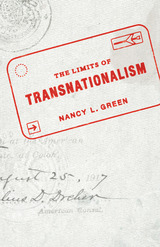
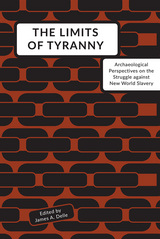
These essays use the concept of struggle to explore the archaeological dimensions of various sites in the Caribbean and the American South and Northeast. The actions of the enslaved, both collectively and as individuals, altered or eliminated the social forces that oppressed them. The contributors discuss the physical struggle through slave uprisings and organized rebellions and the moral struggle through historic laws and ethical behavior common in the eighteenth and nineteenth centuries. They also define the limits of oppression and use the material evidence associated with each site to determine the lengths to which slaves would go to fight their enslavement.
The Limits of Tyranny advances the study of the African diaspora and reconsiders the African American experience in terms of dominance and resistance. This volume will appeal to any archaeologist looking to move beyond the common discourse on slavery and assess more closely the African struggle against tyranny.

The Limits of Utilitarianism was first published in 1982. Minnesota Archive Editions uses digital technology to make long-unavailable books once again accessible, and are published unaltered from the original University of Minnesota Press editions.
Many philosophers have argued that utilitarianism is an unacceptable moral theory and that promoting the general welfare is at best only one of the legitimate goals of public policy. Utilitarian principles seem to place no limits on the extent to which society may legitimately interfere with a person's liberties - provided that such actions can be shown to promote the long-term welfare of its members. These issues have played a central role in discussions of utilitarianism since the time of Bentham and Mill. Despite criticisms, utilitarianism remains the most influential and widely accepted moral theory of recent times.
In this volume contemporary philosophers address four aspects of utilitarianism: the principle of utility; utilitarianism vis-à-vis contractarianism; welfare; and voluntary cooperation and helping others. The editors provide an introduction and a comprehensive bibliography that covers all books and articles published in utilitarianism since 1930.
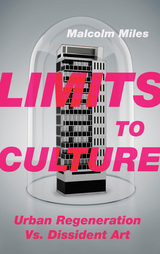
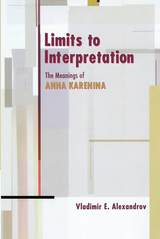
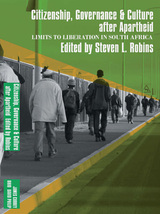
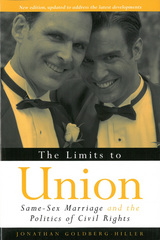
"The Limits to Union is a superb book about the complexities of recent political struggles over same-sex marriage. Goldberg-Hiller offers a sophisticated account of egalitarian rights advocacy and the reaction it has generated from established majorities animated by a 'new common sense' of exclusionary sovereign authority. The author's analysis is multidimensional and nuanced, but the core argument is bold, important, and well-supported. I recommend it very highly to everyone interested in understanding the character, possibilities, and constraints of civil rights amid our contemporary culture wars."
-Michael McCann, author of Rights at Work: Pay Equity Reform and the Politics of Legal Mobilization
"In this excellent book, Goldberg-Hiller uses Hawaii's experience to examine the interaction between courts and the political system. . . . Relying on briefs, legislative statements, and interviews with activists from both sides of the question, he views this familiar debate . . . through the unfamiliar prism of gay marriage, which allows him to gauge the viability and the pliability of the American civil rights ideal, and how gay and lesbian issues fit (or don't fit) within that ideal."
-Willian Heinzen, New York Law Journal
"Goldberg-Hiller presents the history of the same-sex marriage question since it first sparked debate in Hawaii. He follows the shifting debate through court cases, state propositions, and state and federal legislatures, considering questions about the constitutionality of the Defense of Marriage Act and the concept of equal protection under the law for gays and lesbians. This detailed treatment of the legal issues surrounding same-sex marriages is highly recommended."
-R. L. Abbott, University of Evansville
"[A] valuable contribution to the field, situating the gay marriage debate in broader contexts of theory, law and practice. [S]ame-sex marriage is an important issue...that finds itself caught in the friction points of much larger debates over the nature of rights, the limits of sovereignty and the proper role of courts and law in a democratic society. The Limits to Union should therefore be of interest even to those who do not think of themselves as interested in gay and lesbian rights issues."
-Evan Gerstmann, Loyola Marymount University, Law and Politics Book Review

"The Limits to Union is a superb book about the complexities of recent political struggles over same-sex marriage. Goldberg-Hiller offers a sophisticated account of egalitarian rights advocacy and the reaction it has generated from established majorities animated by a 'new common sense' of exclusionary sovereign authority. The author's analysis is multidimensional and nuanced, but the core argument is bold, important, and well-supported. I recommend it very highly to everyone interested in understanding the character, possibilities, and constraints of civil rights amid our contemporary culture wars."
-Michael McCann, author of Rights at Work: Pay Equity Reform and the Politics of Legal Mobilization
"In this excellent book, Goldberg-Hiller uses Hawaii's experience to examine the interaction between courts and the political system. . . . Relying on briefs, legislative statements, and interviews with activists from both sides of the question, he views this familiar debate . . . through the unfamiliar prism of gay marriage, which allows him to gauge the viability and the pliability of the American civil rights ideal, and how gay and lesbian issues fit (or don't fit) within that ideal."
-Willian Heinzen, New York Law Journal
"Goldberg-Hiller presents the history of the same-sex marriage question since it first sparked debate in Hawaii. He follows the shifting debate through court cases, state propositions, and state and federal legislatures, considering questions about the constitutionality of the Defense of Marriage Act and the concept of equal protection under the law for gays and lesbians. This detailed treatment of the legal issues surrounding same-sex marriages is highly recommended."
-R. L. Abbott, University of Evansville
"[A] valuable contribution to the field, situating the gay marriage debate in broader contexts of theory, law and practice. [S]ame-sex marriage is an important issue...that finds itself caught in the friction points of much larger debates over the nature of rights, the limits of sovereignty and the proper role of courts and law in a democratic society. The Limits to Union should therefore be of interest even to those who do not think of themselves as interested in gay and lesbian rights issues."
-Evan Gerstmann, Loyola Marymount University, Law and Politics Book Review

Is there such a thing as a specifically literary discourse, distinguishable from other modes of thought and writing? Is there any way to defend the intuition that a work of literature says something that can't be said in any other way? Drawing on recent work in the philosophies of language and action, Steven Knapp presents a challenging new definition of “the literary” in a forceful analysis that will radically change the sometimes heated debate about formalism.
Formalist theorists have maintained that the uniqueness of the literary lies in the special nature of literary language. Their critics argue that to draw sharp distinctions between literary and nonliterary language is to privilege one kind of text and to insulate cultural activity from social conflict and political change. In the course of a rigorous engagement with such literary theorists, old and new, Knapp develops a provocative defense of the notion of a uniquely literary mode of discourse—a defense that challenges proponents as well as critics of formalism. He extends and deepens current debates about the literary canon, the purpose of literary study, and the aims and implications of the recent critical return to history. His bold and surprising argument has significance for the ethical and political role of literary studies that no one interested in literary theory or the philosophy of art will be able to ignore. Literary Interest will engage theorists, literary critics in all fields, and philosophers addressing issues of aesthetics and language.


As headlines about cash-rich corporations filing for Chapter 11 are appearing more and more frequently, bankruptcy law has come under sharp public scrutiny. Critics feel that irresponsible corporations and individuals may be using the law unfairly. In this clearly written book, legal scholar Thomas H. Jackson identifies the underlying principles of bankruptcy law and develops an economic/psychological analysis of its main problems—a framework that permits him to view the field as a whole rather than as a collection of disparate policies and historical artifacts.
Dealing first with the use of bankruptcy to adjust creditors’ relations among themselves, Jackson shows that individual creditors will attempt to recover as much of the bankrupt firm’s assets as they can. But to maximize the value of the assets, the creditors must act collectively to apportion them according to the priority of entitlements that existed before the bankruptcy.
This is a claim with sweeping implications, and Jackson not only supports it convincingly but examines in some detail the various consequences of adopting it. He takes up several of the most controversial issues in bankruptcy policy today, including the treatment in bankruptcy of collective labor agreements and the recognition of unmatured tort claims of the kind involved in the Manville bankruptcy. His thoughtful analysis arrives at results that are consistent with his economic framework but that espouse no single political ideology.
Turning then to the right of a financial fresh start for debtors who are not firms but human beings, Jackson thaws on recent ideas in psychology to explain why the right exists and why it cannot be waived.
He thus provides a comprehensive scheme for evaluating the principal features of the existing bankruptcy system and for comparing them with past and future alternatives. The book will be of keen interest not only to the specialist but also to those who want to know more about the institution of bankruptcy and its place in our legal system.
READERS
Browse our collection.
PUBLISHERS
See BiblioVault's publisher services.
STUDENT SERVICES
Files for college accessibility offices.
UChicago Accessibility Resources
home | accessibility | search | about | contact us
BiblioVault ® 2001 - 2024
The University of Chicago Press









